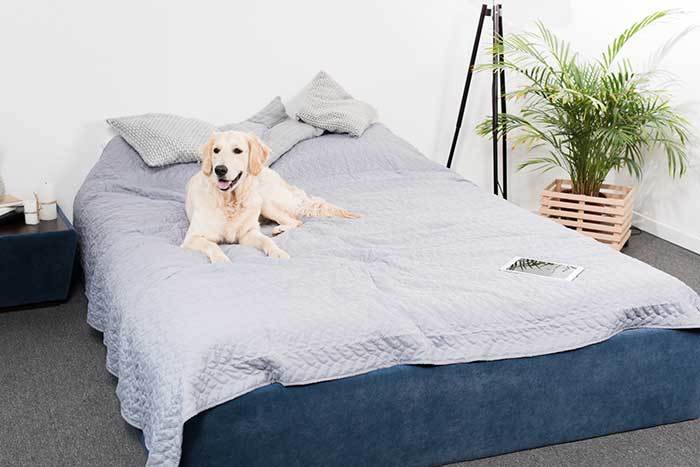My Dog Keeps Peeing on My Bed – What Does It Mean?
We all love and adore our canine friends. But sometimes, they get up to certain behaviors that somewhat stretch our patience. For instance, just what would make a dog pee on my bed? And why not anywhere else?
But even before we delve deeper into the topic, is it alright for the dog to pee on his own bed instead?
Absolutely not. Dog urine on his bed isn’t only an unsightly thing; it also presents numerous hygiene problems. Plus, cleaning a dog’s pee stain isn’t a walk in the park.
Now, consider how much of a problem it can be if the dog pees on your own bed.
But as a responsible pet owner, the last thing you want to do is reprimand the dog. If anything, that approach has been proven to be counterproductive. These adorable, little ones need understanding, especially when they take to unbecoming behavior.
First off, you should go straight to the root cause of the problem. In most cases, the behavior is normal and only requires some training to correct.
But when it’s unusual, it often results from an underlying medical condition, extreme anxiety, or could be an age problem.
Read on to uncover some of the reasons why dogs pee on bed, and what you can do to help them overcome it.
Why Would My Dog Pee on My Bed?
As we’ve already mentioned, there are numerous reasons that could cause your dog to pee on your bed. The following are some of these reasons;
1. Territorial Behavior
Like all animals, especially those with predatory instincts, dogs continually scent-mark their territories. And a popular way they do that is through peeing.
Some pet owners tend to think that a dog’s territory is only restricted to that patch outdoors where it spends most of its time, hence scent-mark it to warn off intruders or notify potential mates.
Well, there are many things that a dog would consider as its territory — ranging from your very own house, your furniture, other pets, your kids, and even yourself.
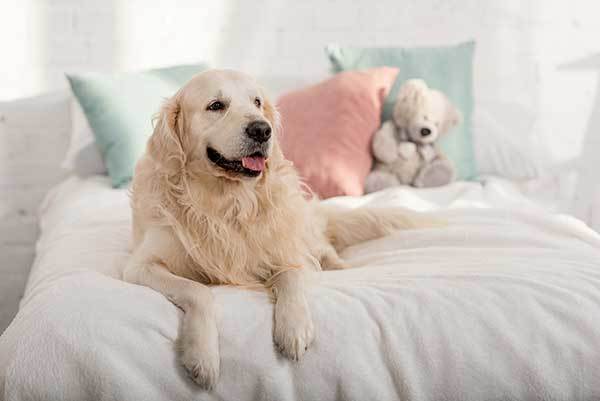
In a dog’s world, all these things belong to him and therefore, should have his prints.
These same territorial instincts often manifest right in your house, through peeing on your bed.
But as a wise and responsible dog owner, you can easily tell whether the problem results from territorial instincts or not.
When dogs scent-mark their territories with urine, they often pee in small amounts, and at elevated surfaces. Dogs that pee on bed in large puddles are unlikely to be marking any territories.
Also, dogs don’t mark territories all the time. The behavior is more common with newly-adopted dogs, if you moved homes, or if there’s a new member of the family [either a human or another pet].
2. Age-related Problems
It has been shown that the problem of a dog peeing on bed generally affects the very young and the very old. As such, puppies need to be potty-trained right from the cradle. That way, they will instinctively know where to pass their urine.
As for old dogs, the problem of peeing in bed might result from poor bladder control, neurological diseases impairing their mobility, or cognitive disorders making them unable to recognize their surroundings. Even humans are victims here anyways.
- 10 Benefits in 1 Daily Treat – PetHonesty’s 10-For-1 Multivitamin chews combine a well-rounded blend of the most essential vitamins and supplements…
- Joint Health with Glucosamine – These natural supplement soft chews have high amounts of glucosamine and other joint support ingredients that reduce…
- Improve Digestion with 1 Billion CFU Probiotics – These one a day dog vitamins contain probiotics and pumpkin, which help keep your dog’s digestive…
Last update on 2024-12-21 / Affiliate links / Images from Amazon Product Advertising API
3. Unfamiliarity with New Surroundings
A dog in a new home is bound to break all the rules in the book. As the dog struggles to acclimatize to its new surroundings, it will experience challenges knowing when and where to pee.
That’s why experts encourage buying a dog that has been duly potty-trained. Alternatively, always go for puppies, as it’s generally easier to impart good behavior in them.
All in all, it will take some time for the dog to adjust to its new environment. Usually, dogs in new homes tend to believe getting outside on their own jeopardizes their security.
You’ll need to train the dog patiently, until such a time it will be confident enough to venture outdoors on its own.
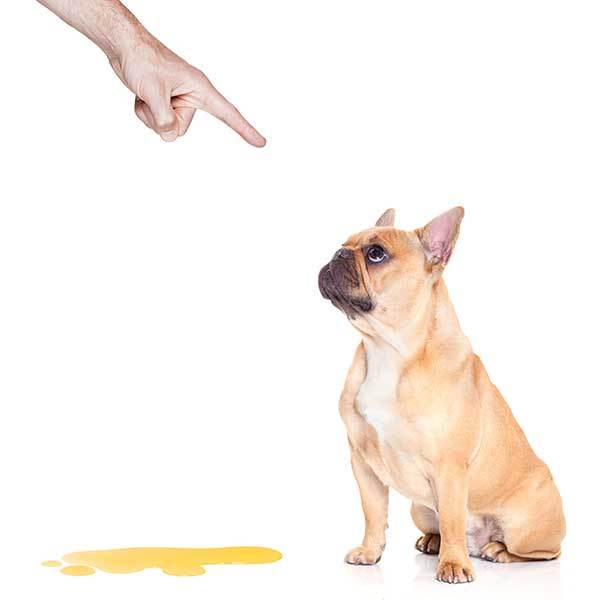
4. Psychological and Emotional Problems
Various emotional and psychological problems constitute what experts call psychologically-induced incontinence. This is a complication that causes your dog to pee inappropriately. The problems could range from intense fear to separation anxiety, depression, and stress.
Mostly, psychologically-induced incontinence results from a traumatic experience. That’s why you must always take the initiative to ensure your dog recovers fully from traumatizing events.
If you adopted the dog from a rescue center and it repeatedly pees on your bed, chances are the canine must have experienced a traumatizing event in the past. As such, it suffers a gradual but steady buildup of stress, ultimately leading to bladder incontinence.
Here are some common stress symptoms in a dog that might clue you in on why the canine pees on bed.
5. Medical Conditions
Certain medical conditions might cause your dog to pee in bed. This especially applies to diseases that affect the dog’s kidney, such as bladder and urinary tract infections.
Other medical conditions that might escalate the problem of dogs peeing in bed include;
- Cushing’s disease,
- Hyperthyroidism,
- Ectopic ulcers,
- Urethral sphincter incompetence,
- Kidney stones,
- Renal cancer,
- Kidney disease,
- Pyometra and Sphincter incompetence.
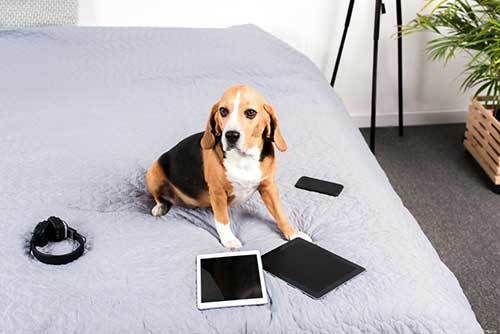
The above medical conditions are often categorized into three main groups, namely; pathological infections, neurological problems, and problems resulting from hormonal deficits.
If a dog suffers from any of the above diseases, it will naturally feel uncomfortable holding on to the slightest urine buildup in its bladders. That’s especially true for conditions that are marked by tumors and inflammations, such as bladder cancers and kidney stones.
However, neurological conditions, such as hip dysplasia, do not interfere so much with a dog’s bladder control as they do with its mobility.
While they don’t take a toll on the canine’s bladder functions, these movement-restricting conditions weaken your dog’s will to get up and go pee on his potty.
- ACTIONABLE HEALTH INSIGHTS: Test for over 270 genetic health conditions and get actionable insights to help you give your pup the best care possible….
- MOST ACCURATE BREED IDENTIFICATION: Test for over 350 dog breeds including dingoes, coyotes, wolves, and village dogs. Using a research-grade…
- TRAIT INSIGHTS THAT HELP YOU BE MORE PREPARED: Test for 55 physical traits. Size, coat, grooming needs — your dog’s traits don’t just make them…
Last update on 2025-01-13 / Affiliate links / Images from Amazon Product Advertising API
Besides hip dysplasia, another notable neurological condition is a cognitive dysfunction syndrome that manifests as Alzheimer’s in dogs.
The condition causes a decline in the function of a dog’s cognitive, sensory, and motor neurons. And when there is disharmony among these three neurons, the dog will simply pee on your bed, and it won’t even know it did it in the first place.
Lastly, it’s important to note that bladder incontinence often causes dogs to pee in your bed while they’re asleep.
Many dog owners have often wondered, why does my dog pee on my bed while sleeping? Since the dog isn’t in control of its bladder, urine will seamlessly pass out when it’s asleep.
6. Lack of Physical Activity
Exercise isn’t only instrumental in keeping your dog safe from diseases, it also helps keep their bladder in check.
Therefore, you should ensure your pooch gets ample physical exercise as regularly as possible. A 30-minutes’ walk 2 to 3 times a day will do a lot of justice to your dog’s urinary system.
The dog will use the opportunity to pee during these walks. Besides, it will become more confident to venture outdoors whenever the urge to pee presents itself.
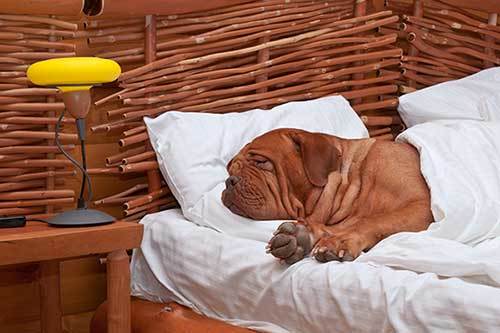
7. An Overly Submissive Behavior
It’s the dream of any pet owner to have their pets submit to them. But submission can change from a perfectly desirable to an outright repulsive behavior.
Dogs that are over-submissive tend to be very eager to please their owners and other members of the household. And at this point, its behaviors won’t befit the cuddly, little friend you’ve always wanted him to be.
Over-submissive dogs will urinate as a response to just about any stimuli. From fear to excitement to anxiety…anything will cause them to respond by peeing.
The mere sight of you coming back home from work is enough to have them deposit large puddles of pee on your sheets. So, maybe you’ve been wondering, why does my dog pee on my bed in front of me?
Well, it’s their way of showing respect but unknowing to them, they’re overdoing it. Fortunately, you can correct this behavior through rigorous training.
How to Stop My Dog from Peeing On My Bed?
Maybe you’ve been wondering, how can I get my dog to stop peeing on my bed? Well, the solutions to that problem are nearly as many as its causes.

According to research, there are numerous remedies you can apply to help your pooch rise above the problem of peeing on your bed.
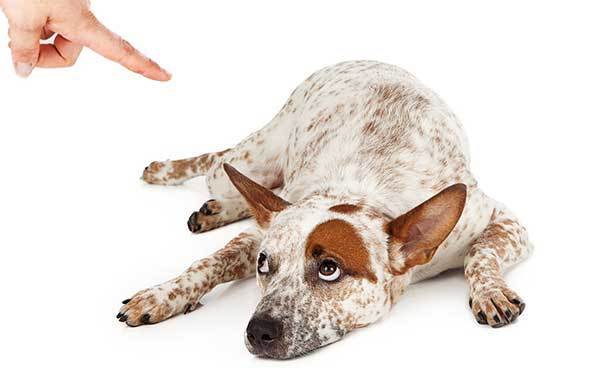
The following are some of these solutions.
1. Keep the Bed off Limits
For a dog to pee on your bed, it must be able to access the bed in the first place. What if you keep the bed off limits?
To do that, always keep your bedroom door closed whenever you aren’t there with the dog. Also, you may consider crating the dog, especially if you can’t be around all the time to keep a watch on his activity.
As you pursue this line of action, take note of how the dog responds. For instance, where else does he pee?
If he begins to mess your furniture and carpet, then the problem wasn’t simply peeing on your bed – the dog generally lacks good potty habits. Maybe it’s time to introduce a refresher course.
2. Have a Robust Exercise Plan
As we already mentioned, daily walks are highly-resourceful in helping your dog overcome the habit of peeing on your bed. But how do these exercises work?
First, while walking with your dog, the canine will discover numerous things to scent-mark; from trees to garbage bins, road signposts etc.
After scent-marking these objects, the dog will focus on claiming them as its own, as opposed to dwelling on the stuff inside your house. As such, the dog will always be looking forward to more walks, so it can “survey” its outdoor territories.
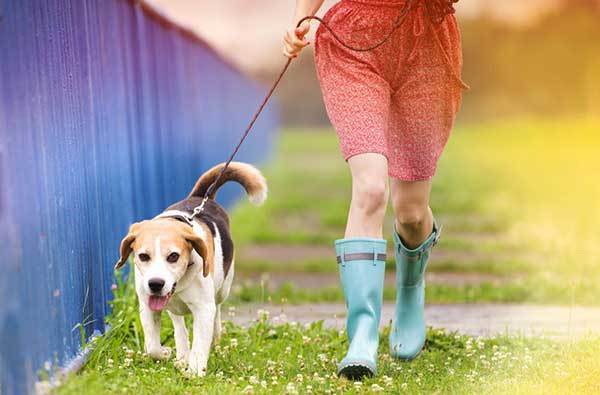
Another way exercises work for dogs is that your pooch will discover many other stimuli.
We mentioned that dogs may pee on your bed in response to emotional or psychological trauma. Many of these traumas result from the fear and anxiety of reliving a past event.
If, say, your dog has a phobia for fireworks, you could consider taking the dog to a festival that features lots of fireworks and other loud bangs. As the dog quivers in fear, you’ll be there to console and reassure it. Ultimately, you’ll help it face and overcome its worst fears.
Daily exercises also enable dogs to meet new people, new pets, and have new exciting experiences, all of which help to calm them down.
3. Take Care of Environmental Enrichment
Humans need a favorable environment to be most productive. The same applies to dogs.
These furry, little companions deserve an environment where they can explore and make discoveries on their own. It helps develop their cognitive, emotional, and social skills.
First, eliminate all stress factors from a dog’s environment. An example is other bully dogs. Your pooch should be ready to venture outdoors without the fear of attack from other resident dogs.
On your part, desist from giving your dog severe punishments or harsh reprimands. Instead, introduce positive reinforcements as a way of stimulating the canine’s emotional and mental response to its surroundings.
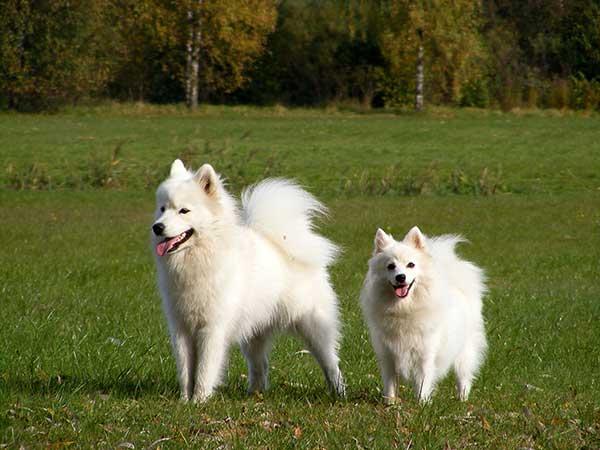
4. Train the Dog
Training is one of the most effective methods of helping your canine overcome the problem of peeing in bed, especially if the condition is more of a behavioral than it’s a pathological one.
According to experts, lapses in potty training often result from miscommunication between a dog and its owner.
Therefore, always insist on taking your dog through an obedience class. It may interest you to note that your dog might be peeing on your bed simply because it doesn’t understand what you mean when you ask it to pee elsewhere.
Most importantly, dogs should be trained when they’re still young and eager to learn. You probably are already familiar with the adage “you can’t teach an old dog new tricks”. Therefore, spare as much time and effort as possible in imparting canine education on your puppies.
It’s unusual for a puppy that has undergone rigorous potty-training to simply wake up one day and decide to mess up your sheets.
Older dogs may be a bit difficult to train. That’s because they have so many distractions to deal with. This is where positive reinforcements come in.
Each time the dog achieves a milestone, offer him a treat. The treat should be given in such a manner that the dog associates it with good behavior. For instance, you can treat the dog immediately it jumps off your bed and rushes to pee in its potty.
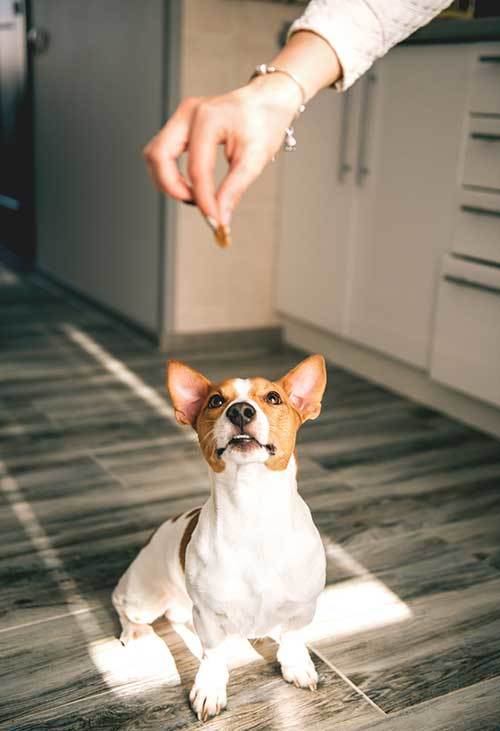
5. Clean the Mess Immediately
This is the worst part of dealing with dog pee, but a process you must undertake anyway.
You should always clean your bed sheets immediately the dog pees on them. That’s because dog pee contains numerous enzymes that only the dog can smell.
Therefore, whenever they’re around the same spot they urinated, they’re likely to pee there some more. Fortunately, there are numerous dog pee removal products you can use to get rid of the smell and stain associated with the urine.
6. Schedule an Appointment with Your Vet
If all the above recommendations fail, you may consider visiting your vet to have the dog examined further. That’s especially true if the dog also exhibits other symptoms that are suggestive of an infection.
If the condition isn’t severe, your vet may recommend a couple of supplements before subjecting the dog to a drug therapy.
Examples of such supplements include; Organic Hemp Dog treats and Hemp Oil Calming supplement.
The best thing about these supplements is that they’re made from all-organic compounds. Therefore, they present mild and minimal side effects. They’re also holistic, meaning they cure a host of canine medical conditions.
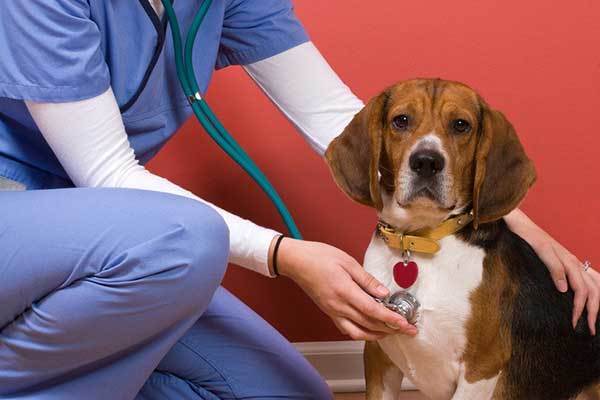
Vet visits are not only crucial in helping manage the problem of peeing on bed. They also offer an opportunity to have the dog examined for any other health and dietary condition. Therefore, vet appointments should be a matter of routine.
Conclusion: So, Why Would My Dog Pee on My Bed?
As we’ve seen, there are numerous causes of this unpleasant habit. Thankfully, it’s often a behavioral condition that you can correct through training. If it calls for it, schedule a visit with your vet to have the dog examined more closely.
Checkout Our Favorite Dog Products
1. BEST PUPPY TOY
We Like: Snuggle Behavior Toy with Heart Beat & Heat Pack – Ideal toy for new puppies.
2. BEST DOG TRAINING PROGRAM
We Like: Doggy Dan The Online Dog Trainer – Stop any dog problem and raise the perfect puppy with The Online Dog Trainer.
3. BEST FOOD FOR DOGS AND PUPPIES
We Like: Victor Super Premium Pet Food – Ideal for growing puppies and pregnant or lactating females. Also provides sustained energy for sporting dogs and dogs with high physical demands.
4. BEST DOG PUZZLE TOY
We Like: Outward Hound Interactive Puzzle Toy – Every dog loves chasing squirrels at the park. The Outward Hound Hide-a-Squirrel Puzzle Toy gives your dog the same feeling as though he was outdoors chasing live squirrels.
5. Best Bone Broth for Dogs
We Like: (Solid Gold – Human Grade Bone Broth for Dogs) – Simmered Beef Bone Broth With Turmeric Provides A Nutrient-Dense And Flavorful Addition To Your Dog’s Meal + Rich In Natural Collagen From Beef Bones.

